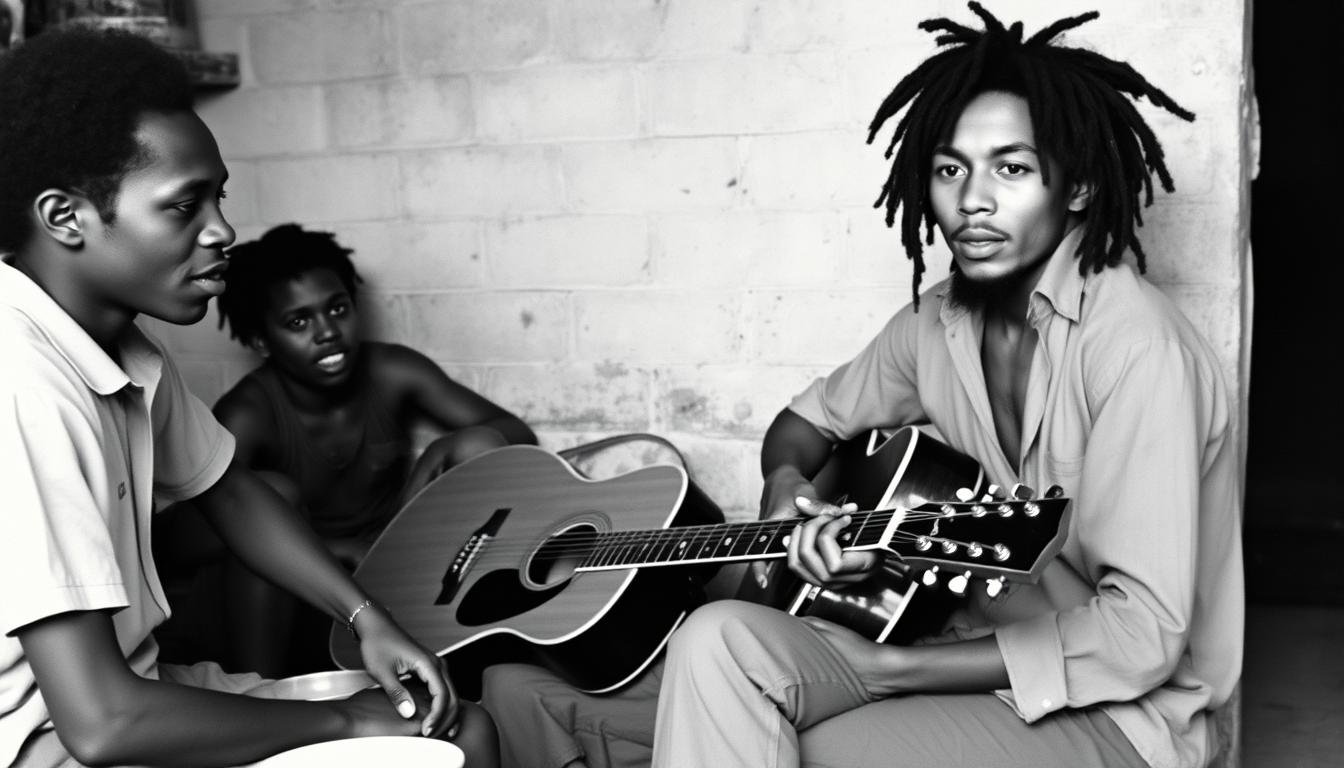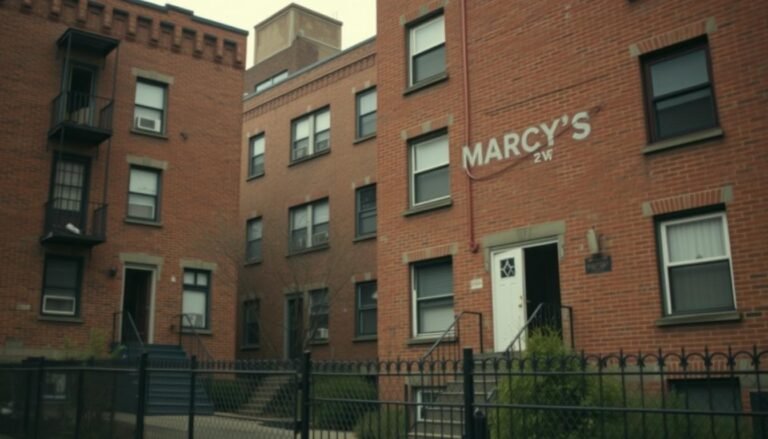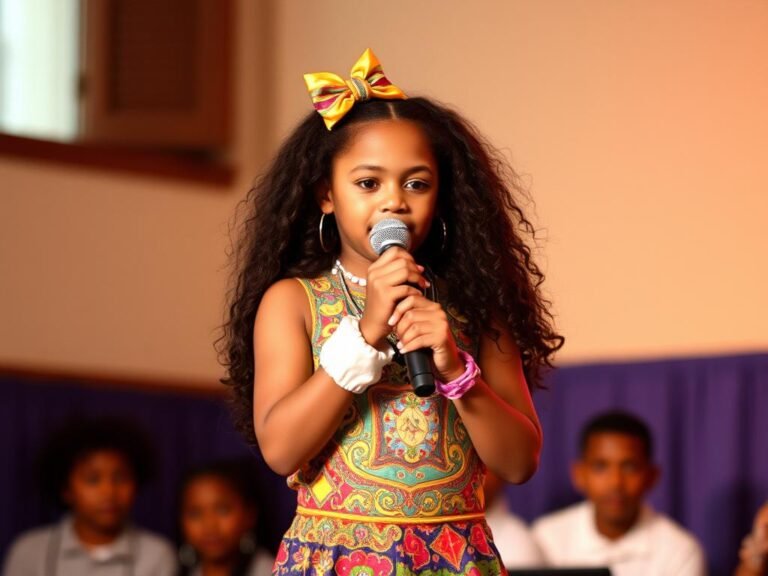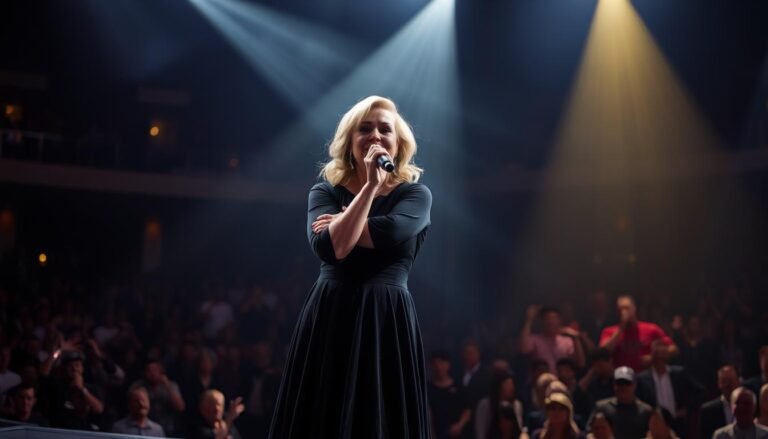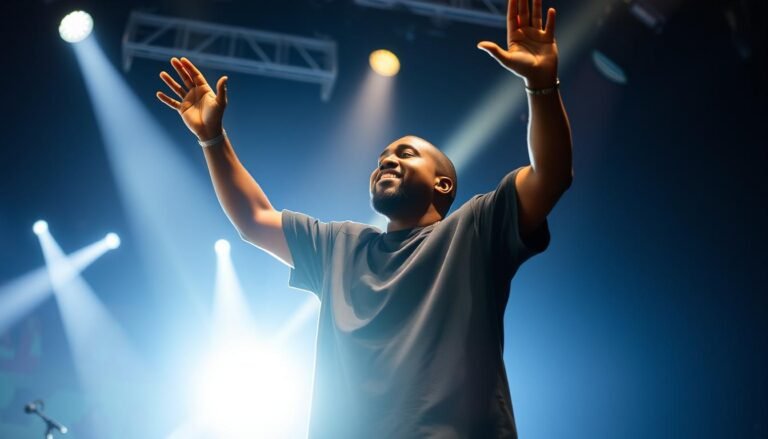Bob Marley: How Reggae Became the Soundtrack of Revolution
Few musicians have transcended their art to become global symbols of resistance and hope like Bob Marley. Born in rural Jamaica in 1945, Marley transformed reggae from a local musical style into a powerful vehicle for social change, spiritual awakening, and political revolution. His music, infused with messages of love, unity, and resistance against oppression, continues to resonate with audiences worldwide decades after his passing. This exploration of Bob Marley Reggae and Revolution reveals how one man’s music became the heartbeat of social movements across the globe.
Bob Marley’s early life in Jamaica shaped his musical journey and revolutionary perspective
The Roots of Rebellion: Bob Marley’s Journey
Robert Nesta Marley was born in Nine Mile, a small village in St. Ann Parish, Jamaica. His father, Norval Marley, was a white Jamaican of British descent, while his mother, Cedella Malcolm, was a Black Jamaican. This mixed heritage would later influence Marley’s perspective on racial unity and social justice.
At age 12, Marley moved to Kingston’s Trench Town, a neighborhood known for its poverty but rich in musical creativity. It was here that he met fellow musicians Bunny Wailer and Peter Tosh, with whom he would later form The Wailers. The harsh realities of life in Trench Town exposed Marley to the stark inequalities that would fuel his revolutionary lyrics.
In the early 1960s, Jamaica was experiencing significant political and social change following its independence from British rule. This period of transformation provided the backdrop for Marley’s musical development and his growing awareness of social issues. His exposure to the Rastafarian movement, with its emphasis on African identity, spirituality, and resistance to oppression, profoundly shaped his worldview.
“My music will go on forever. Maybe it’s a fool say that, but when me know facts me can say facts. My music will go on forever.” – Bob Marley
Reggae as Protest Music: The Voice of the Oppressed
Before Bob Marley, reggae was primarily a local Jamaican musical style, evolving from ska and rocksteady. What distinguished Marley’s approach to reggae was his deliberate fusion of compelling rhythms with powerful social commentary. This combination of Bob Marley Reggae and Revolution created a new paradigm for protest music that could simultaneously entertain and educate.
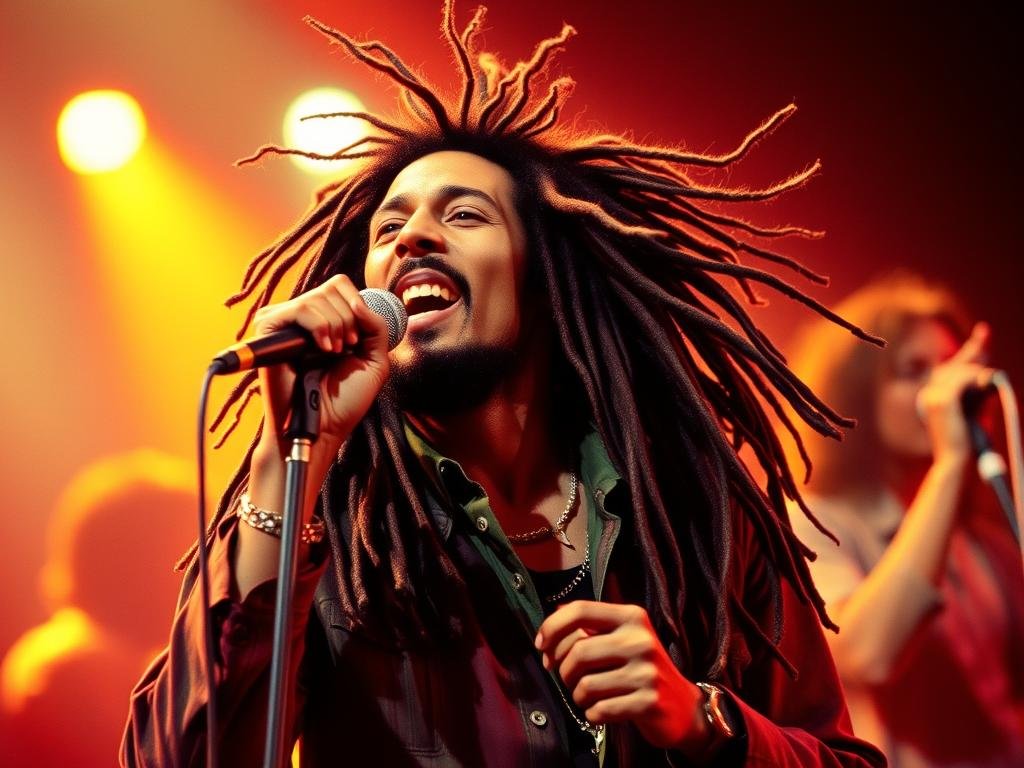
Marley’s performances were electric combinations of musical artistry and revolutionary messaging
Marley’s transformation of reggae into a tool for social and political commentary can be seen in landmark songs like “Get Up, Stand Up,” co-written with Peter Tosh. The song’s direct call to action—”Get up, stand up, stand up for your rights”—became an anthem for oppressed people worldwide. Its straightforward language and infectious rhythm made complex political ideas accessible to global audiences.
“Redemption Song,” one of Marley’s most powerful compositions, demonstrates his ability to blend personal reflection with universal themes of freedom. With lines drawn from speeches by Pan-Africanist Marcus Garvey, the song urges listeners to “emancipate yourselves from mental slavery,” highlighting Marley’s belief that true revolution begins in the mind.
Other significant protest songs in Marley’s catalog include:
Through these social justice anthems, Marley established reggae as a legitimate form of protest music that could speak truth to power while remaining accessible to mainstream audiences. His genius lay in creating music that was simultaneously revolutionary in content and irresistible in form.
Rastafarian Philosophy and Revolutionary Thought
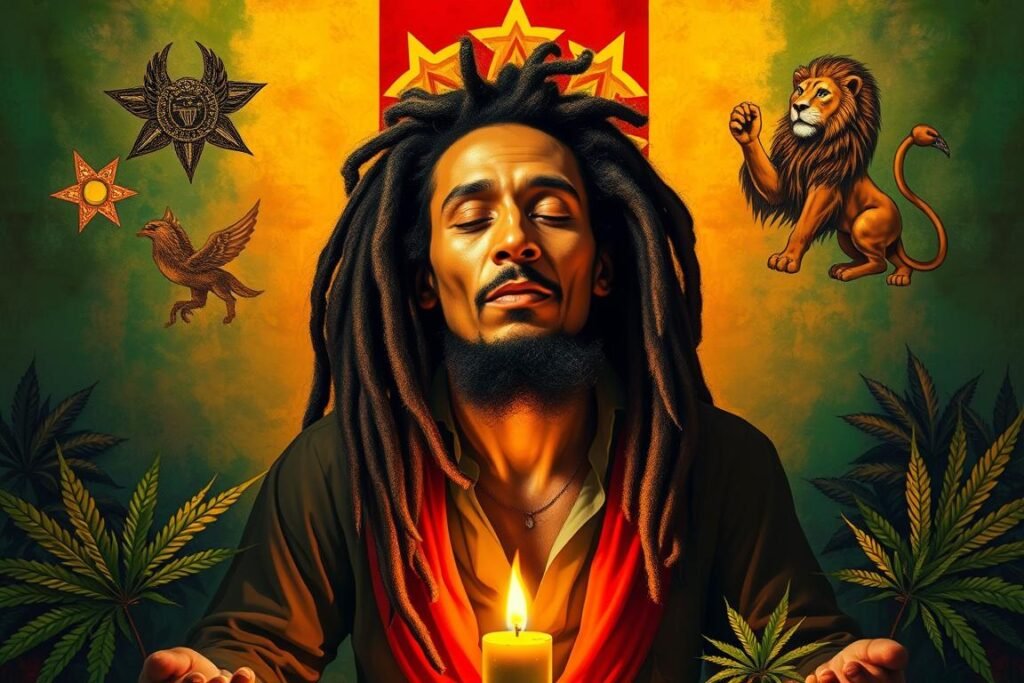
The Rastafarian movement provided spiritual foundation for Marley’s revolutionary message
The Rastafarian movement provided the spiritual and philosophical foundation for much of Marley’s revolutionary thinking. Emerging in Jamaica in the 1930s, Rastafari combined elements of Christianity, Pan-Africanism, and indigenous beliefs. Its adherents viewed Ethiopian Emperor Haile Selassie I as divine and advocated for the repatriation of people of African descent to their ancestral homeland.
Marley embraced Rastafarianism in the mid-1960s, adopting its distinctive appearance with dreadlocks and its dietary restrictions. More importantly, he absorbed its critique of Western “Babylon” society and its vision of liberation and unity. These beliefs permeated his music, giving his revolutionary messages a spiritual dimension that distinguished them from purely political protest songs.
The Rastafarian concept of “I and I,” which emphasizes the unity of all people with God, influenced Marley’s inclusive approach to revolution. Rather than promoting division, his music called for unity across racial, national, and class lines. This universal appeal helped his revolutionary message resonate with diverse audiences worldwide.
“One good thing about music, when it hits you, you feel no pain.”
Marley’s revolutionary philosophy was not limited to abstract ideals. He actively supported liberation movements in Africa, particularly Zimbabwe’s struggle for independence. His 1979 performance at Zimbabwe’s independence celebration symbolized his commitment to translating musical messages into real-world action.
Navigating Caribbean Politics Through Music
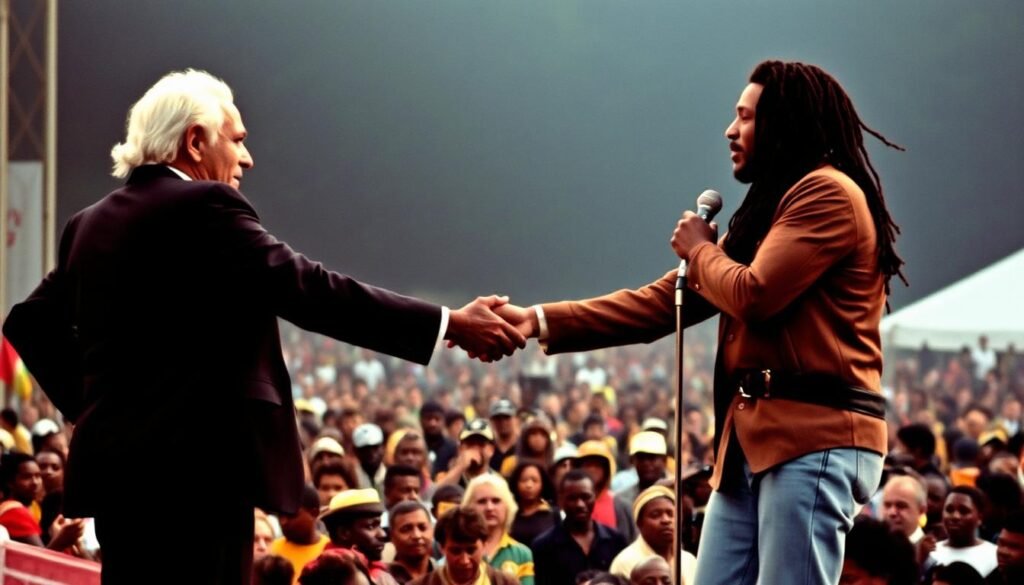
The iconic moment at the One Love Peace Concert when Marley united political rivals on stage
Jamaica’s political landscape in the 1970s was marked by intense rivalry between the People’s National Party (PNP) and the Jamaica Labour Party (JLP). This conflict often erupted into violence, particularly in Kingston’s impoverished neighborhoods. As Jamaica’s most prominent cultural figure, Marley could not avoid being drawn into these Caribbean politics.
In December 1976, gunmen attacked Marley’s home, wounding him, his wife Rita, and his manager Don Taylor. The attack occurred just days before the Smile Jamaica Concert, which some perceived as supporting the incumbent PNP government. Despite his injuries, Marley performed at the concert, demonstrating his courage and commitment to peace.
The pinnacle of Marley’s political intervention came at the One Love Peace Concert in 1978. In a powerful symbolic gesture, he brought the leaders of Jamaica’s rival political parties—Prime Minister Michael Manley and opposition leader Edward Seaga—on stage and joined their hands above his head. This moment transcended music, showing how Marley used his platform to promote reconciliation and unity.
Marley’s approach to politics was complex. While he addressed specific political situations, particularly in Jamaica and Africa, he avoided explicit partisan alignment. Instead, he focused on broader principles of justice, equality, and human rights. This approach allowed his revolutionary message to transcend particular political contexts and speak to universal human struggles.
The One Love Peace Concert (April 22, 1978) was organized during a state of emergency in Jamaica. Marley’s performance of “Jamming” with the spontaneous uniting of political rivals became one of the most iconic moments in music and political history.
From Jamaica to the World: Global Impact
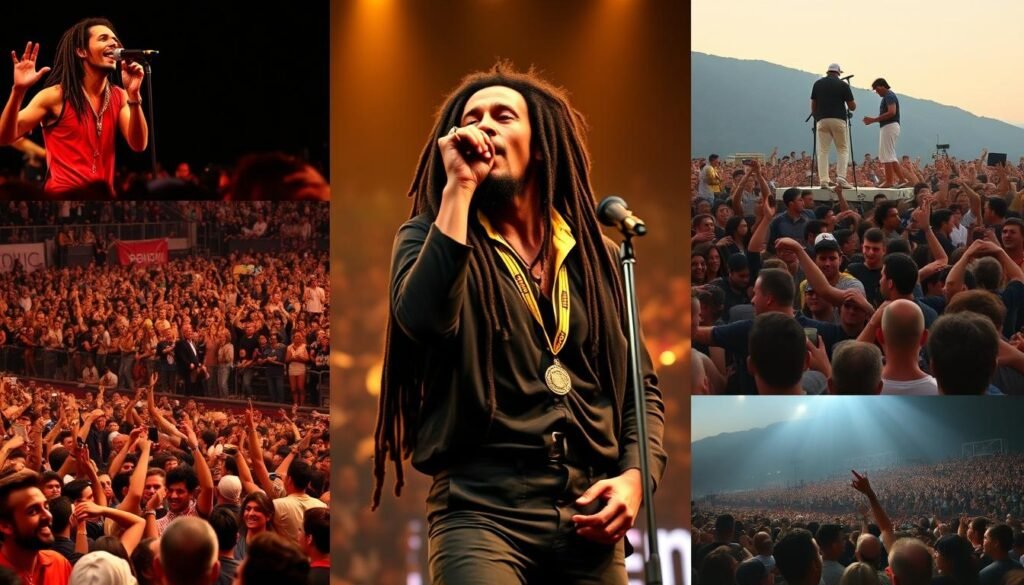
Marley’s message resonated with diverse audiences worldwide, transcending cultural boundaries
Bob Marley’s revolutionary impact extended far beyond Jamaica’s shores. Through strategic collaboration with Island Records and international touring, he introduced reggae music and Rastafarian philosophy to global audiences. His 1975 album “Natty Dread” and the live album “Live!” featuring “No Woman, No Cry” marked his international breakthrough.
The album “Exodus” (1977), recorded during Marley’s exile in London following the assassination attempt, cemented his global status. Time Magazine later named it the “Album of the Century,” and its themes of displacement, liberation, and homecoming resonated with marginalized communities worldwide.
Marley’s music became particularly significant in Africa, where it soundtracked liberation movements in Zimbabwe, South Africa, and beyond. His 1980 performance at Zimbabwe’s independence celebrations symbolized the connection between his music and real-world revolutionary change.
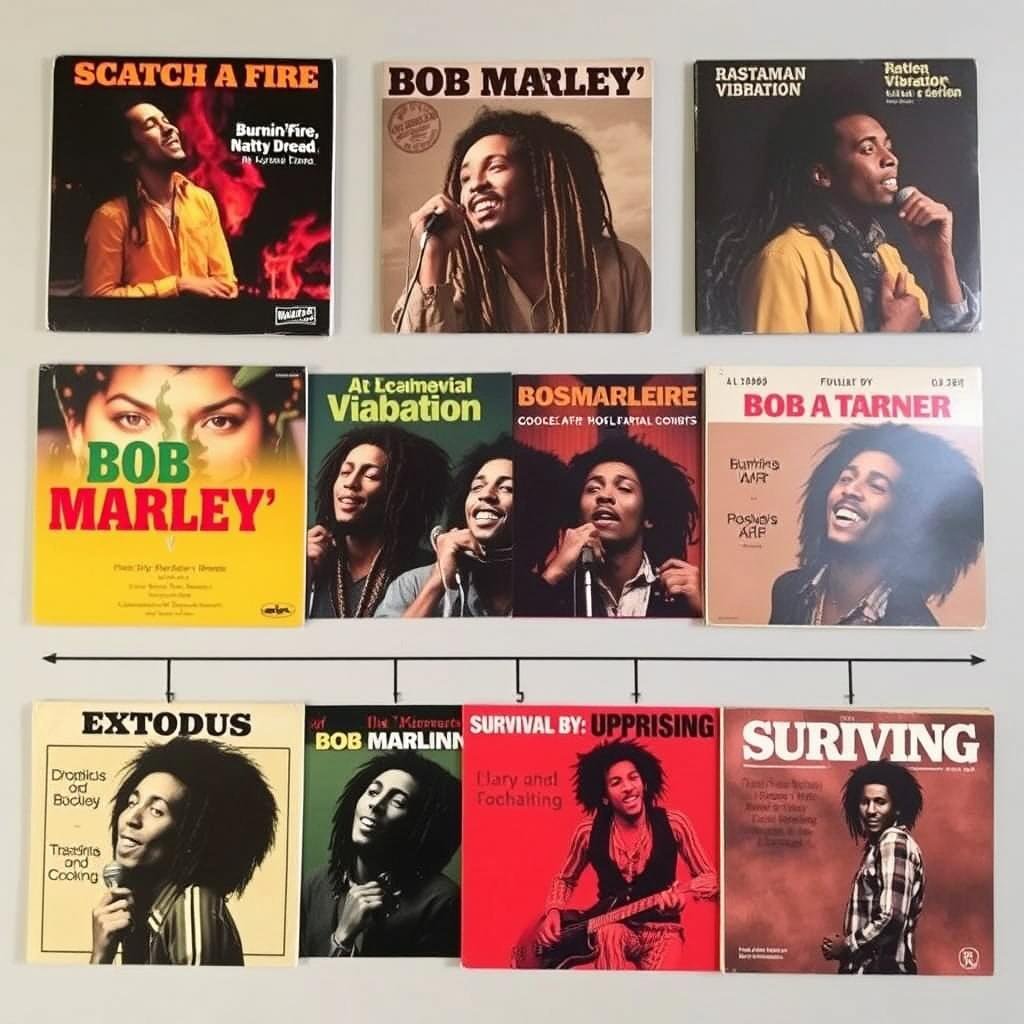
Marley’s album covers reflected the evolution of his revolutionary messaging
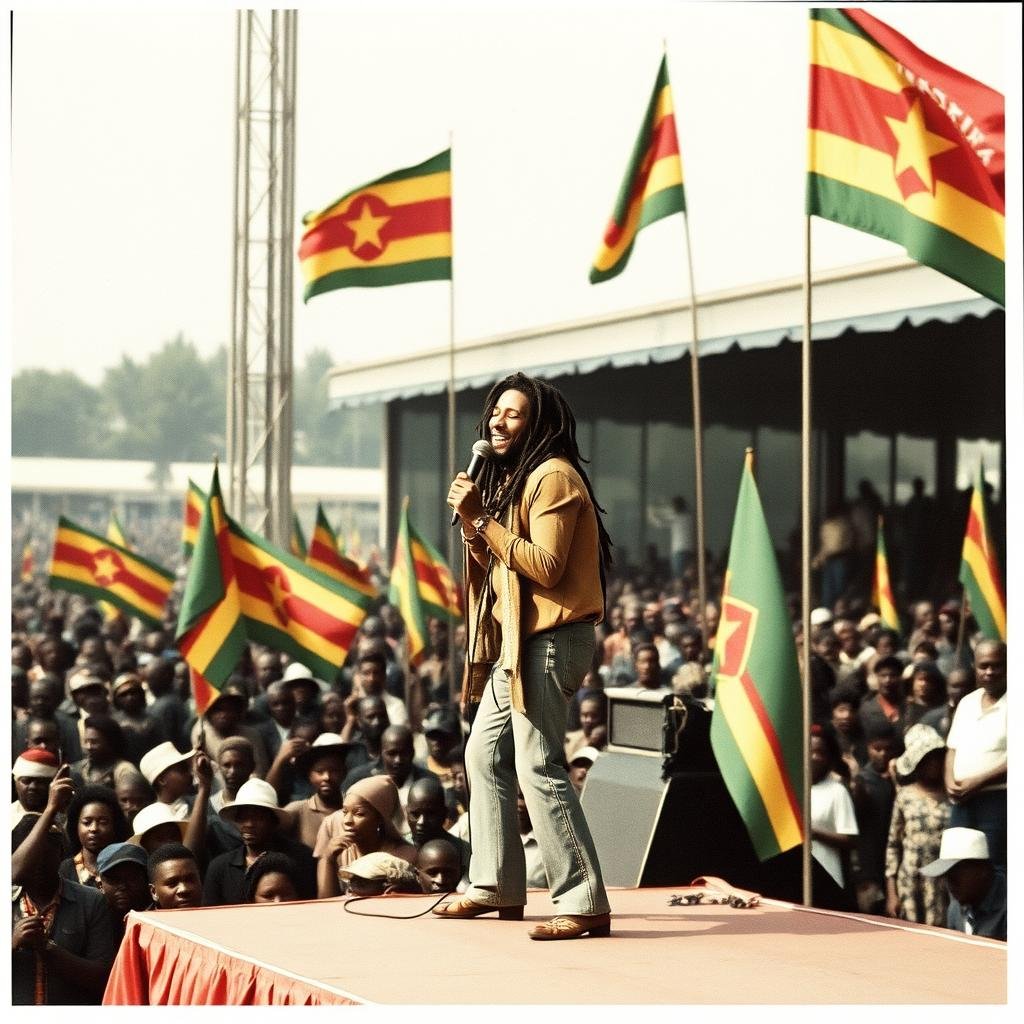
Marley performing at Zimbabwe’s independence celebration, 1980
In Europe and North America, Marley’s music introduced many to concepts of Pan-Africanism and anti-colonial struggle. College campuses and progressive communities embraced his revolutionary message, while mainstream audiences were drawn to the infectious rhythms and melodies that carried these powerful ideas.
What made Marley’s global impact unique was his ability to communicate revolutionary ideas through music that appealed across cultural, racial, and class divides. Unlike purely political figures, he could reach audiences who might otherwise be unreceptive to messages of radical social change.
The Art of Music Activism: Marley’s Approach
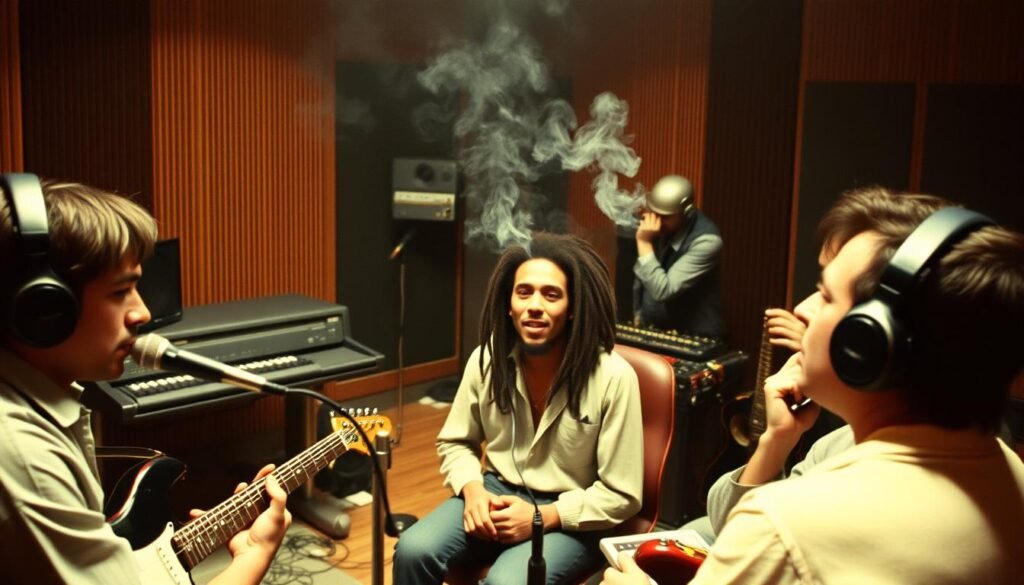
Marley’s studio work combined musical innovation with revolutionary messaging
Bob Marley’s approach to music activism was multifaceted and sophisticated. Unlike some protest musicians who prioritized message over medium, Marley understood that revolutionary ideas would reach wider audiences if delivered through compelling music. He and The Wailers created songs with irresistible grooves, memorable melodies, and accessible lyrics that could appeal to listeners regardless of their political awareness.
Marley’s vocal delivery was central to his effectiveness as a musical revolutionary. He could convey urgency, compassion, defiance, and hope through his voice, giving emotional resonance to his political messages. Songs like “Concrete Jungle” and “Slave Driver” communicate the pain of oppression not just through lyrics but through the emotional texture of Marley’s performance.
The production of Marley’s music also served his revolutionary aims. Working with producers like Lee “Scratch” Perry and Chris Blackwell, he created a sound that was authentic to reggae’s Jamaican roots while accessible to international audiences. This balance allowed his revolutionary message to spread globally without being diluted.
How did Bob Marley balance entertainment with activism?
Marley understood that revolutionary messages needed to be delivered through compelling music to reach wide audiences. He created songs with irresistible grooves and memorable melodies that could appeal to listeners regardless of their political awareness. This approach allowed his activism to reach people who might otherwise be unreceptive to political messaging.
What made Marley’s lyrics particularly effective for activism?
Marley’s lyrics combined directness with poetic imagery, making complex political ideas accessible. He used simple, powerful phrases like “Get up, stand up” that could be easily understood and remembered across language barriers. His lyrics also drew from biblical references and Rastafarian philosophy, giving his revolutionary messages spiritual depth and universal appeal.
Marley’s stage presence amplified his revolutionary impact. His energetic, trance-like performances created communal experiences that embodied the unity he advocated in his lyrics. Concert footage shows how he could transform audiences into active participants in a shared vision of liberation and justice.
Enduring Legacy: Marley’s Influence Today
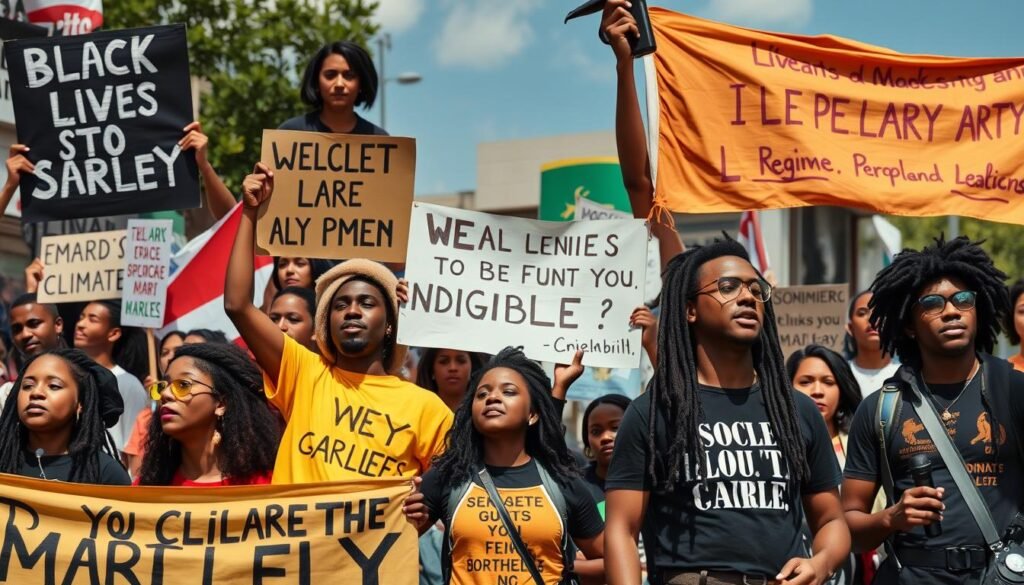
Contemporary social movements continue to draw inspiration from Marley’s revolutionary vision
More than four decades after his death in 1981, Bob Marley’s revolutionary impact continues to reverberate globally. His music remains a soundtrack for social movements, from anti-apartheid struggles in the 1980s to contemporary movements for racial justice, environmental protection, and economic equality.
Marley’s influence extends to subsequent generations of musicians across genres. Artists as diverse as Lauryn Hill, Nas, Sinéad O’Connor, and Rihanna have cited him as an inspiration, both musically and in their approach to social commentary. The annual Bob Marley Lectures at the University of the West Indies examine his continuing relevance to contemporary issues.
Beyond music, Marley’s revolutionary legacy lives on through institutions like the Bob Marley Foundation, which supports education, health, and sustainable development initiatives in Jamaica and beyond. The conversion of his former home at 56 Hope Road in Kingston into a museum preserves his legacy for future generations.
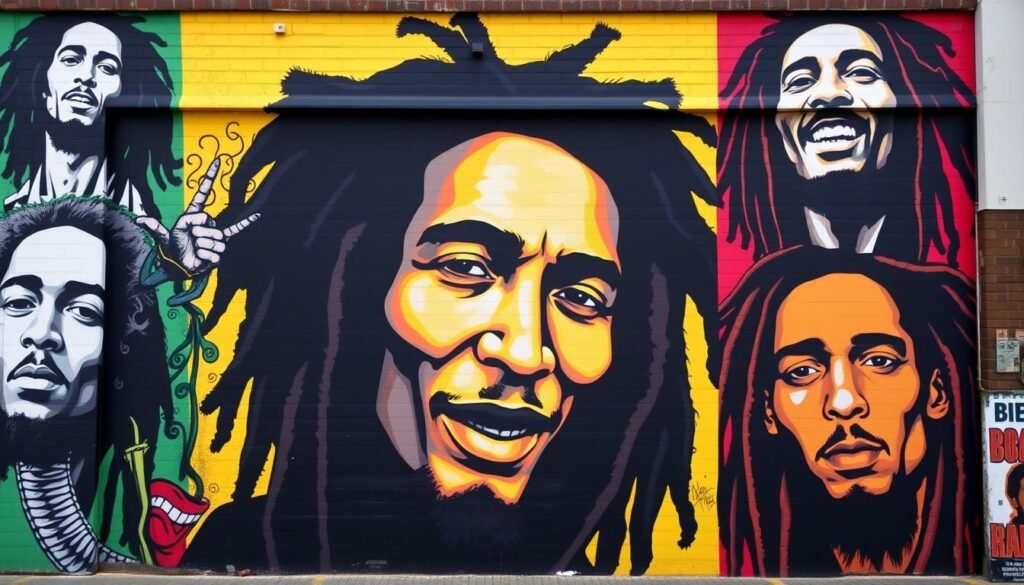
Murals and street art worldwide celebrate Marley’s revolutionary spirit
Perhaps most significantly, Marley’s revolutionary vision continues to offer hope and inspiration in a world still marked by inequality, oppression, and conflict. His message that music can be both a balm for suffering and a catalyst for change remains as relevant today as it was during his lifetime.
As new generations discover Bob Marley Reggae and Revolution, they find not just a historical figure but a continuing source of inspiration for their own struggles. The revolutionary potential of music that Marley embodied continues to inspire artists and activists seeking to create a more just and compassionate world.
“The greatness of a man is not in how much wealth he acquires, but in his integrity and his ability to affect those around him positively.”
Conclusion: The Revolution Continues
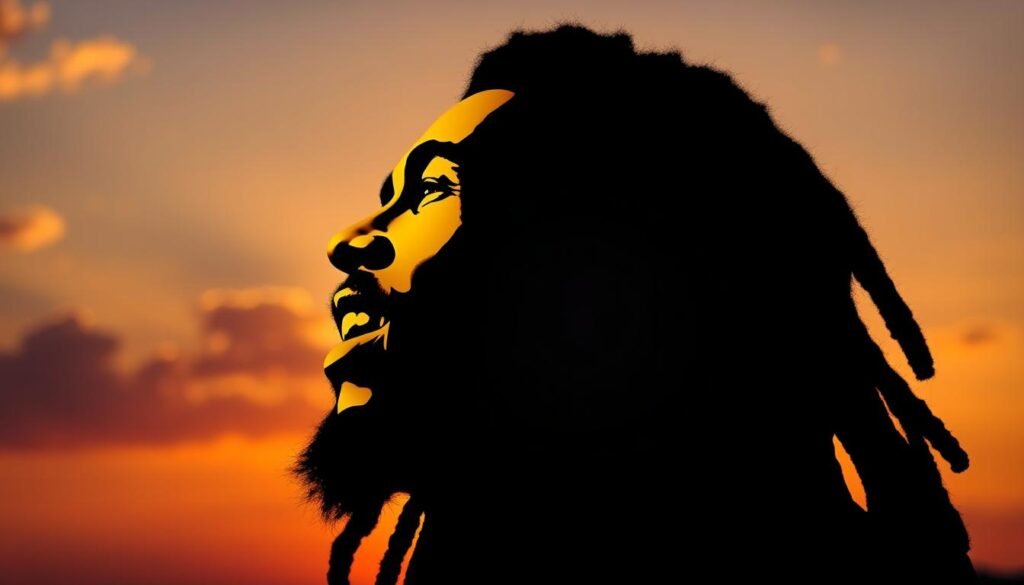
Marley’s revolutionary spirit continues to inspire generations
Bob Marley’s transformation of reggae into a vehicle for revolutionary thought represents one of music’s most powerful examples of art as a catalyst for social change. By fusing infectious rhythms with messages of liberation, unity, and resistance, he created a template for music activism that continues to inspire artists and movements worldwide.
The enduring power of Bob Marley Reggae and Revolution lies in its ability to speak to universal human experiences while addressing specific struggles. Whether confronting racial injustice, economic inequality, or political oppression, Marley’s music offers both solace and motivation—a soundtrack for both healing and action.
As we face contemporary challenges from climate change to persistent inequality, Marley’s revolutionary vision remains relevant. His belief in music’s power to unite people across differences and inspire collective action offers a model for addressing today’s complex problems. The revolution that Marley helped soundtrack continues, with new voices and new rhythms but the same fundamental quest for justice and human dignity.
Explore More About Music and Social Change
Discover how music continues to drive social movements and inspire change around the world.

